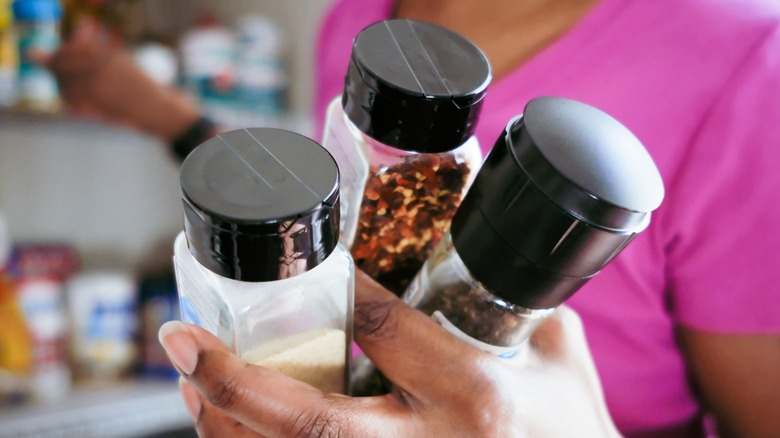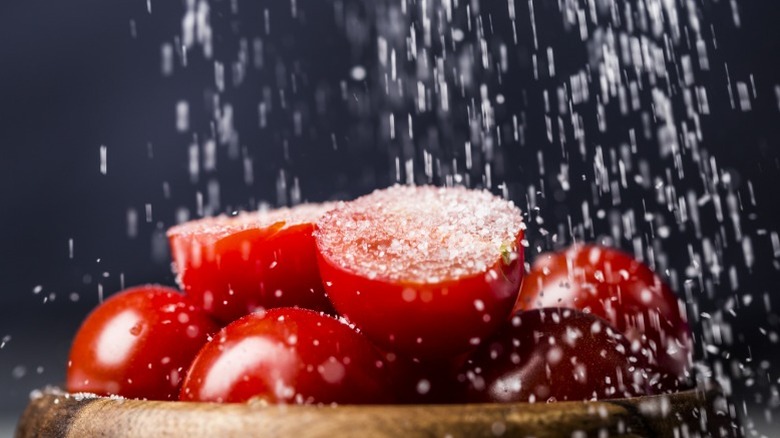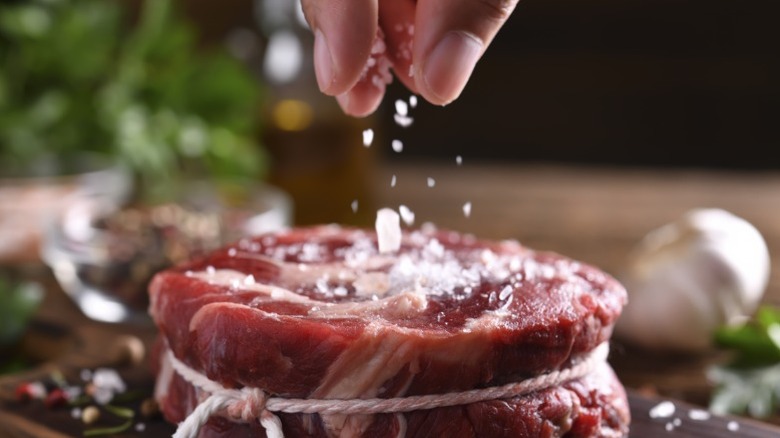Are You Waiting Too Late To Season Your Dishes?
Timing is everything when it comes to cooking, especially when it involves seasoning your food. Depending on the goal, there are key timeframes for adding salt, pepper, or another spice to an entree, vegetable, or even a homemade sandwich that will have an impact on the final dish. "When cooking savory dishes, the timing of adding your seasoning does affect the finished product," says Jim Primeau, executive chef at Halls Chophouse Nexton in Summerville, South Carolina.
Many home cooks add seasoning toward the end of the cooking process as a final touch or garnish. "Seasoning at the end of the cooking process is not bad as long as you are merely adjusting the seasoning," Primeau explains. "If you are doing all of your seasoning at the end of the cooking process, the guest will just taste salt instead of a heightened natural flavor of the protein." Luckily, Primeau offers a couple of tips to avoid this common rookie mistake. "Be sure to start with well-seasoned raw product, always taste your food before serving your guests, and do minor adjustments at the end for the best results."
How to season veggies when cooking at home
Salt is a universal seasoning with a myriad of uses. "You need to know how the particular item is going to react to the cooking method and the salt that you add," Jim Primeau says. Sometimes, a recipe calls for using salt at the beginning of the cooking process; tomatoes are a perfect illustration. "If you cut ... tomatoes up and put them in a bowl and add salt, you will now have cut up tomatoes in a natural tomato water, which will almost become a macerated tomato relish," Primeau told The Takeout. "These items have such a high level of water in them that the first step in a lot of recipes is to heavily salt and press them to secrete some of the liquid," Primeau shares. Eggplant, cucumber, and mushrooms have similar properties.
In other instances, Primeau advises waiting to add salt until after cooking is complete. "If you are doing a batch of caramelized onions, you would not want to season them because this would draw out their moisture and negatively impact the sugary, golden finished product," he says. If you really must add salt, do it once the onions are done sautéing on the stovetop.
How to season protein when cooking at home
Chef Jim Primeau gave personal recommendations for seasoning proteins to embark plenty of flavors. The first is to season your protein of choice in advance, ideally 1.5 hours early, especially if you're cooking something big, like a whole prime rib, or a pork or beef roast. "This will allow the salt to permeate deeper into the muscle and result in a more evenly seasoned finished product," Primeau says. You could use a store-bought spice blend or mix up your own.
Another trick is to use a brine, or a mix of water, sugar, salt, and sometimes herbs, like garlic, instead of a dry seasoning. "When using a brine, depending on the size of the protein, you can brine the product overnight or up to multiple days, depending on what results you may desire," Primeau shares. The longer you brine a meat, the longer the liquid can impart its flavor. This technique works particularly well to cook juicy pork chops, chicken breasts, and corned beef. "The brine essentially replaces the natural juices of the protein, which results in an even and thorough seasoning throughout," Primeau explains.


